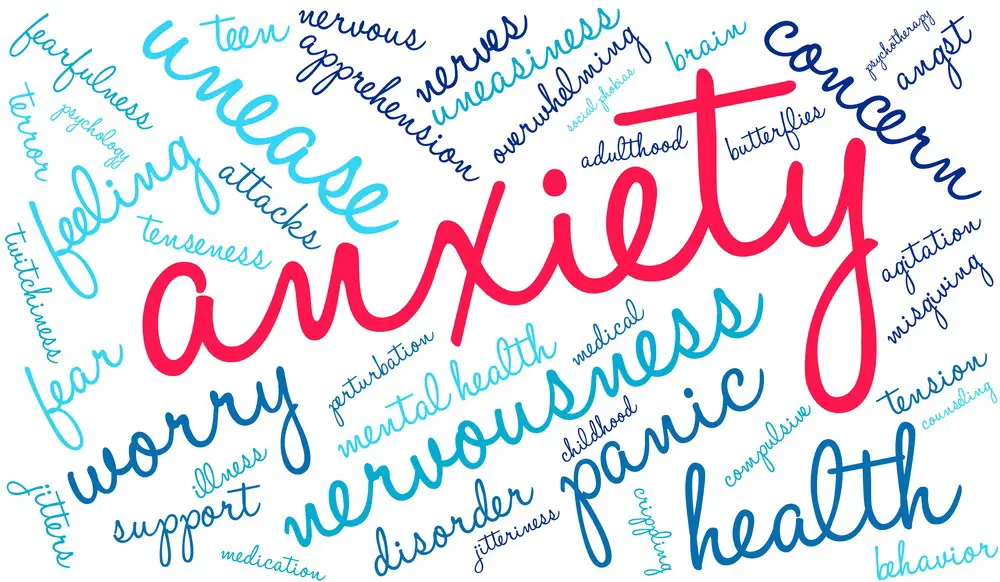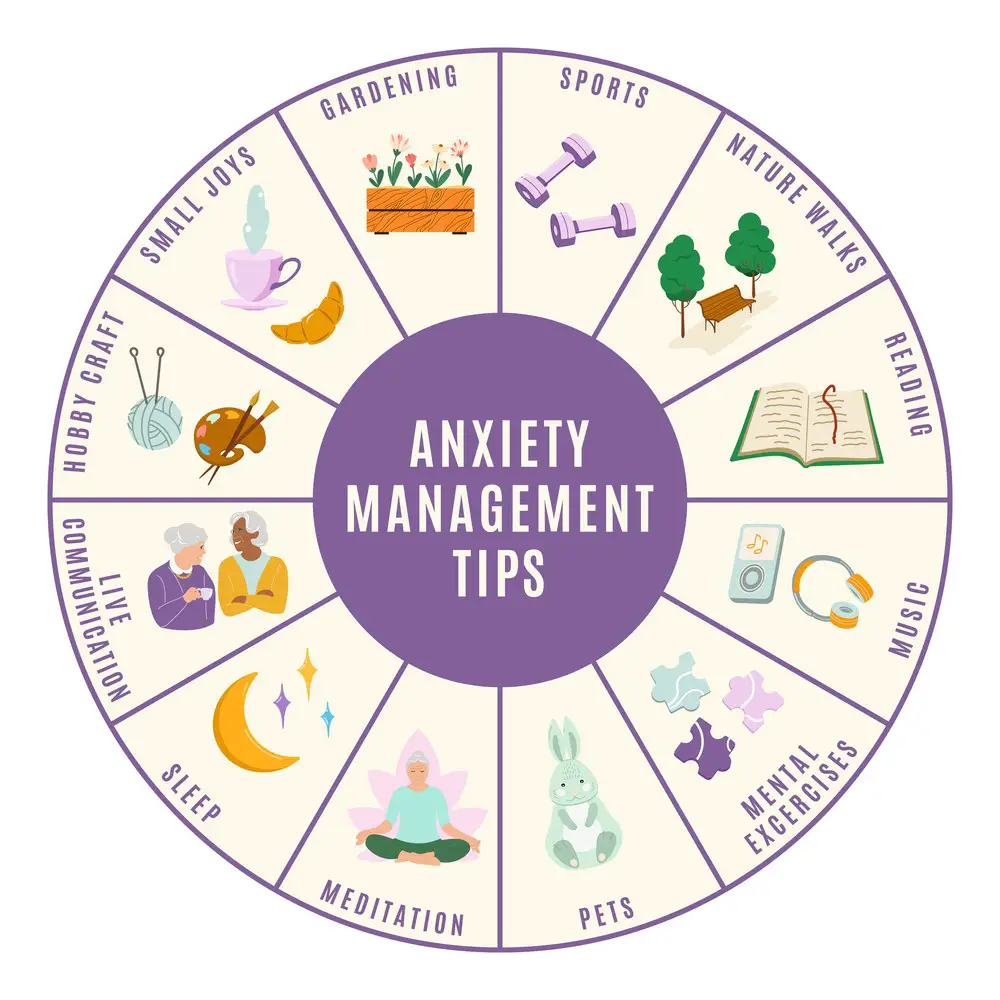As a BetterHelp affiliate, we receive compensation from BetterHelp if you purchase products or services through the links provided
Dealing with anxiety can be challenging, and knowing how to comfort someone experiencing it through text can be even more difficult. However, it can help alleviate someone’s anxiety through thoughtful and empathetic messages. In today’s constantly connected world, supporting a friend or loved one over text is valuable, especially when face-to-face interaction is impossible.
This article aims to provide a comprehensive guide on comforting someone with anxiety via text, delving into understanding the nature of anxiety and the intricacies of written communication. We will also discuss guidelines for providing emotional support, recommending coping mechanisms, and suggesting avenues for professional support to create a strong support system to help alleviate their symptoms while navigating the anxiety journey together.
Key Takeaways
- Understand anxiety and its nature to provide better emotional support.
- Communicate effectively and empathetically through text.
- Offer helpful coping techniques and consider suggesting professional assistance when appropriate.
 Understanding Anxiety
Understanding Anxiety
Identifying Symptoms
When trying to comfort someone with anxiety over text, it is important to understand the symptoms they may be experiencing. Anxiety can manifest in various ways, both physically and mentally. Common symptoms include:
- Racing heartbeat
- Shortness of breath
- Nausea
- Excessive worry
- Feeling overwhelmed
Recognizing these symptoms is essential to empathize with the person you’re trying to comfort. This will help you tailor your response to their specific needs and emotions.
Determining Types of Anxiety
There are different types of anxiety disorders, and understanding which one your friend or loved one is experiencing can help you provide the most appropriate support. Some common anxiety disorders are:
- Generalized Anxiety Disorder (GAD): This is characterized by constant and excessive worry about various aspects of life, such as work, family, or health, even when there is no apparent reason for concern.
- Panic Disorder: People with this condition experience sudden, intense episodes of fear followed by physical symptoms like a racing heartbeat or shortness of breath.
- Social Anxiety Disorder: This involves an overwhelming fear of social situations, often causing the person to avoid them completely or feel extreme nervousness when they must participate.
When comforting someone with anxiety over text, remember the specific challenges they might face due to their type of anxiety. This will help you provide more targeted and effective support. Remember to maintain a friendly tone throughout your conversation and empathize with their struggles.
Communicating Effectively
Considerate Approach
Adopting a considerate and empathetic approach is essential when comforting someone with anxiety over text messages. Show them that you understand their feelings and support them. You can offer encouragement, such as, “You are always loved,” or remind them that they’re safe by saying, “You’re safe, I’ve got your back.” Remember to validate their anxiety and celebrate their strengths.
Being an Active Listener
One of the most crucial aspects of communication is being an active listener. Here are a few ways to ensure your loved one feels heard and understood:
- Acknowledge their feelings: Respond with phrases like “Ugh, that sucks!” to show you understand their struggles.
- Ask questions: Gently prompt them to share more about their experience if they’re comfortable doing so.
- Respect their boundaries: If they don’t want to discuss their anxiety further, don’t push them.
Moreover, avoid using “toxic positivity” phrases like “Just think about positive things!” Instead, offer a listening ear, allowing them to vent and express their emotions openly.
 Methods of Communication
Methods of Communication
There are several methods to communicate effectively with someone experiencing anxiety. Consider the following modes of communication to provide the best support:
- Text messages: This medium can be comforting as it allows the person to read the messages at their own pace. Encourage them to focus on their breathing with a message like, “Close your eyes and focus on your breathing.”
- Voice messages: Sending a voice message with your soothing words can add a personal touch, making them feel more connected and supported.
- Phone or video calls: Hearing your voice or seeing your face can be comforting for some people, but make sure they are comfortable with this mode of communication before initiating a call.
Remember to adapt your communication style to the individual’s preferences and needs, helping them feel at ease and support during difficult moments.
 Providing Emotional Support
Providing Emotional Support
Reassuring Them
When comforting someone with anxiety over text, it’s essential to provide reassurance. Let your friend know that you have their back and they’re safe with you. Use phrases like “I’m here for you” and “You can always count on me.” Making your support clear can help them feel less overwhelmed and isolated.
In times of stress, remember to be patient and empathetic. Give them enough time and space to express their thoughts and emotions. Your understanding goes a long way in alleviating their anxiety.
 Understanding Their Feelings
Understanding Their Feelings
Empathy plays a crucial role in offering emotional support. Listening and avoiding making assumptions or judgments is important to understand your friend’s feelings fully. Ask open-ended questions to encourage conversation and help them express their thoughts more easily.
When discussing their anxiety, be mindful of your language and responses. Avoid using phrases that may brush off their concerns or tell them to calm down. Instead, validate their emotions, acknowledge their fear, and offer a safe space for them to talk.
Offering Positive Affirmation
Providing positive affirmation is an essential part of comforting someone with anxiety. Remind them of their strengths and express your love and appreciation for them. Use phrases like “You are always loved” and “I appreciate your uniqueness.” Celebrating their individuality can have a significant impact on their feelings of self-worth.
When discussing potential solutions or coping strategies, focus on their well-being. If they feel overwhelmed, help them break down tasks or decisions into smaller, manageable steps. Doing this can help your friend feel more in control of their situation and ease their anxiety.
Guidelines to Follow
Keeping a Check on Your Body Language
Even though you communicate via text, your choice of words and how you present them can convey your intentions and feelings. Pay attention to the tone of your messages and avoid using all caps or excessive exclamation points, which might be misinterpreted. Also, consider using emojis to express your emotions and to show empathy towards the person with anxiety. Just be mindful not to overuse them, as you want the focus to be on your supportive words.
Creating a Safe Space
Creating a sense of safety is essential to comfort someone with anxiety over text. Your messages should be caring, reassuring, and positive, showing that you’ll be there to support them. Validate their emotions by acknowledging that anxiety is tough, and clarify that they are not alone in their struggle. One way to show this is by saying, “You’re safe; I’ve got your back.” This provides them with a comforting, non-judgmental environment that can help alleviate some of their overwhelming feelings.
 Acknowledging Their Overwhelming Feelings
Acknowledging Their Overwhelming Feelings
When discussing their anxiety, acknowledge the intensity of their emotions. Instead of downplaying their feelings or suggesting they “just think about positive things,” focus on understanding their perspective. Let them know that their anxiety and isolation are valid and that it’s perfectly okay for them to feel this way. To do this, you can use phrases such as:
- “That sounds really tough, I’m here for you.”
- “I can’t imagine how overwhelming this must be, but I want to help.”
- “Your feelings are important; you don’t have to go through this alone.”
These acknowledgments foster a sense of acceptance and understanding, ultimately making it easier for the person with anxiety to open up and discuss their experience. Remember, your main goal is to provide comfort and support, so keep your tone friendly and compassionate throughout the conversation.
 Offering Coping Mechanisms
Offering Coping Mechanisms
Introducing Grounding Exercises
Grounding exercises are an effective way to help someone deal with anxiety. These techniques can help them reconnect with the present moment and regain a sense of calm. You could suggest the following grounding exercises:
- 5-4-3-2-1 technique: Encourage your friend to name five things they can see, four things they can feel, three things they can hear, two things they can smell, and one thing they can taste.
- Breath focus: Ask them to close their eyes and take slow, deep breaths, focusing on the sensation of inhaling and exhaling.
- Physical sensations: Suggest they hold an object like a stress ball or a smooth stone and focus on how it feels in their hand.
Remember to keep your suggestions gentle and maintain a friendly tone, as you do not want to overwhelm them.
 Suggesting Therapy Options
Suggesting Therapy Options
Therapy is a great treatment option for individuals struggling with mental health disorders like anxiety. You could mention the potential benefits of seeking professional help. Try to emphasize that they are not alone and that speaking to a therapist can be a valuable step toward understanding and managing their anxiety. Some therapy options to consider include:
- Cognitive Behavioral Therapy (CBT): An evidence-based therapy that helps patients identify and modify negative thought patterns.
- Online therapy platforms: This option enables people to get the help they need from the comfort of their own homes.
Be supportive and encourage them to explore different therapy options to find the best fit for their circumstances and preferences.
 Promoting Meditation and Breathing Techniques
Promoting Meditation and Breathing Techniques
Meditation and breathing techniques are simple yet powerful coping mechanisms that can help someone effectively manage anxiety. Here are some suggestions you can share with them:
- Guided meditation: Direct your friend to apps or websites featuring guided meditation sessions, emphasizing the variety of options available for people with different experience levels.
- Deep breathing: Teach them a simple breathing exercise, like inhaling deeply for four counts, holding their breath for four counts, and exhaling for four counts.
Encourage them to take time each day for self-care and to practice these techniques, as they can greatly contribute to their mental well-being and overall quality of life.
 Suggesting Professional Support
Suggesting Professional Support
Encourage Them to Seek Help
When someone you care about is struggling with anxiety, it’s important to encourage them to seek professional help. Gently remind them there’s no shame in reaching out to mental health professionals and that doing so can be a crucial step toward managing their stress. Offer your support by saying, “I know it can be tough, but reaching out to a therapist or counselor might be helpful for you.”
Sharing Resources and Information
Provide your friend or family member with resources and information about mental health professionals in their area. You might want to share websites, phone numbers, or personal experiences with therapists. Here are some suggestions for what you could say:
- “I noticed this mental health clinic near your house. They offer therapy sessions, and their reviews are great.
- I saw an online therapy platform that might fit you well. They have therapists specializing in anxiety.”
By giving them multiple options, you’re helping reduce the burden of researching and deciding.
Introducing Support Groups
Another way to comfort someone with anxiety is by connecting them with support groups. These gatherings can be immensely beneficial, providing a safe space for individuals to discuss their experiences and learn from others going through similar situations. To introduce support groups, consider these messages:
- “There’s a local support group I read about. It’s specifically for people dealing with anxiety. I think it could be a great way for you to connect with others who understand what you’re going through.”
- “I found an online forum where people share their anxiety experiences and coping strategies. It might be worth checking out.”
By offering different avenues for support, you’re showing your care and helping them take that important step in addressing their mental health.
When Professional Therapy is Needed: Signs to Look Out For
While comforting someone with anxiety over text can be an immediate and personal way to provide support, there are situations where professional therapy may be a more suitable solution. Recognizing the signs that professional help is needed can be crucial for the well-being of the individual you’re trying to assist. Here are some signs to watch out for:
- Escalation in Anxiety Symptoms: If the person’s anxiety symptoms worsen over time, despite your support and encouragement, this may indicate a need for professional help.
- Expressions of Hopelessness or Desperation: Should the individual express feelings of hopelessness, despair, or talk about self-harm, it’s critical to encourage them to seek professional therapy immediately.
- Daily Life Interruptions: If anxiety interferes with their daily life, relationships, or work, therapy with a mental health professional could be the right action.
- Ineffectiveness of Current Coping Strategies: If the strategies and comfort you provide over text no longer seem effective, and the person is stuck in a cycle of anxiety, professional intervention may be required.
- Withdrawal from Friends and Family: When someone with anxiety begins to withdraw from friends and family, isolating themselves, it could signal a more significant underlying issue that needs professional attention.
In these cases, while your support is still valuable, encouraging the individual to seek professional therapy can be the most loving and responsible action. A mental health professional will have the tools, techniques, and knowledge to help them address their anxiety more deeply. Offering to help them find a therapist or go with them to an appointment can be a tangible way to show your continued support.
Frequently Asked Questions

What are some calming words to send in a text?
When comforting someone with anxiety over text, choose words that convey love, support, and reassurance. Some examples include:
- “You’re not alone. I’m here for you.”
- “You’re doing great. Breathe and take it one moment at a time.”
- “Everything will be okay. We’ll get through this together.”
How can I help someone stop overthinking through texting?
To help someone stop overthinking through texting, try these strategies:
- Ask open-ended questions to help them explore their thoughts and feelings.
- Encourage them to focus on the present moment and remind them to breathe.
- Share a positive story or memory to help shift their focus.
- Offer empathy and reaffirm that feelings of anxiety are normal and valid.
What are some comforting texts for those with anxiety and depression?
When texting someone experiencing anxiety and depression, provide a sense of understanding and support. Here are some examples:
- “I’m here for you. It’s okay to feel this way.”
- “You’re stronger than you think, and I believe in you.”
- “It’s okay to take a break. Be gentle with yourself.”
How can I encourage someone with anxiety over text?
To encourage someone with anxiety over text, focus on highlighting their strengths and successes. You can say:
- “You’ve faced challenges before, and you can do it again.”
- “I believe in your ability to overcome this obstacle.”
- “Remember, every small step counts. Keep going.”
What do I text someone who’s worried about a situation?
To help someone who’s worried about a situation, send texts that provide practical advice and emotional support such as:
- “Let’s break down the problem together and find a solution.”
- “I’m here to help and support you in any way I can.”
- “No matter the outcome, know that you’re capable and strong.”
How can I reassure someone with anxiety through texting?
Reassure someone with anxiety over text with these approaches:
- Remind them of their support network and that you’re there for them.
- Validate their feelings and let them know it’s okay to be anxious.
- Offer concrete suggestions to help, like deep breathing or mindfulness exercises.
Remember to maintain a friendly tone and keep your responses in English and second person perspective to show empathy and care for the person you’re comforting.
About the Author: Jacob Maslow – From Personal Struggles to Guiding Others Through Anxiety
I’m Jacob Maslow, a writer with personal experience navigating the complex terrain of mental health and relationships. Living with the daily stress of an ongoing custody battle, I’ve turned to Lexapro to manage my mental health, and I consider myself a therapy veteran.
Until a few months ago, my relationship with my two minor kids was close and fulfilling, but that bond has been severed by my ex, who suffers from severe narcissism. Despite court-ordered shared custody, she has consistently broken these orders and refuses to allow me any communication with our children. This heart-wrenching situation has been dragging on for years but has also been a catalyst for my growth and understanding of mental health challenges.
To clear my head, I take long walks daily, a ritual that serves as reflection and respite. During these walks, I often gather my thoughts and find the strength to continue.
I write these articles about mental health, including topics like comforting someone with anxiety, to extend my hand to those dealing with similar battles. Whether it’s narcissistic partners or general mental health challenges, I firmly believe that anyone can overcome these issues.
In addition to my writings on mental health, I also run a legal site where I guide others in conflicts with a spouse who refuses to comply with court orders. The site is where I transform my personal experiences into tools to help others, emphasizing the importance of community and support in the face of adversity.
By sharing my story and the lessons I’ve learned, I hope to shed light on the paths to healing and empowerment, offering solace to those who feel alone in their struggles.
- How to Transform a Home’s Patio Space into a Relaxing Space - March 23, 2025
- 5 Strategies to Use a Cell Phone to Help Manage Your Stress - March 23, 2025
- 4 Ways to Use Measurements to Create a Relaxing Sleep Space - March 23, 2025
This site contains affiliate links to products. We will receive a commission for purchases made through these links.


 Understanding Anxiety
Understanding Anxiety Methods of Communication
Methods of Communication Providing Emotional Support
Providing Emotional Support Understanding Their Feelings
Understanding Their Feelings Acknowledging Their Overwhelming Feelings
Acknowledging Their Overwhelming Feelings Offering Coping Mechanisms
Offering Coping Mechanisms Suggesting Therapy Options
Suggesting Therapy Options Promoting Meditation and Breathing Techniques
Promoting Meditation and Breathing Techniques Suggesting Professional Support
Suggesting Professional Support
